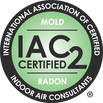Mike's Home Inspector BlogMichael Burfitt |
|
Like many homeowners, I have watched plenty of home related TV shows over the years. I have also mentioned previously that I have an overall positive opinion of Mike Holmes although I can certainly think of plenty of valid criticisms regarding his various shows, mostly revolving around how he blurs the line between construction and inspection. So, it goes without saying that I was excited to hear about a show focusing on home inspections starring an actual home inspector. How awesome to see our relatively unknown industry getting its own show and getting to showcase what a home inspector does and why it's important to get a home inspected! Now that I have had a chance to see a few episodes I think I have seen enough to form a fair opinion.
The show features Joe Mazza, a home inspector from New York state who definitely has a personality fit for TV even though he is a rookie to that medium. What do I think of his show? In my opinion it is a significant misrepresentation of our industry to put it mildly. Of course, actual inspection jobs would not translate well to TV, as they can take an average of over 2 hours just on site alone and can require plenty of detailed explanations of technical issues in layman's terms. My criticisms are many and mainly revolve around how Joe, who to my knowledge is an actual licensed inspector in both New York and Connecticut, does very little actual inspecting (it’s more of a show about house hunting and renovations) and much of what he states is misleading at best and flat out wrong at worst. Let me count some of the numerous issues I see just from a few episodes: Much of the Show is Outside the Scope of a Home Inspection Joe is seen to be touring the homes with Noel Gatts, an interior designer. Simply put, we home inspectors do not generally inspect or comment on cosmetic finishes and while it is no doubt a valuable profession, we do not “team up” with interior designers on our inspections to recommend cosmetic work. We Do NOT Tear Out Walls or Do Renovation Work I’m not sure what the standards in New York or Connecticut are, but all major home inspection organizations make it very clear that it is a serious ethical violation to perform repairs or renovations to any home within 1 year of performing an inspection. This show also makes the connection that home inspectors are just contractors that do inspections on the side or are just inspecting to look for ways to make money renovating. While a person can certainly do both jobs successfully, in my experience they require VERY different skillsets. We also are not invasive in our inspections, and as fun as being destructive can be I definitely do not bring a sledgehammer with me! We Don't Make Definitive Statements in Most Circumstances This show has many scenes where Joe says something like “that’s asbestos!” or “that’s black mold!”. While there are signs that something is very likely asbestos or mold, only a lab test can confirm it! I also got upset when while tearing out a wall, one of the workers quickly and confidently states, “this wall isn’t load bearing!”. While I agree it likely isn’t, in most areas (including here in Nova Scotia) only a qualified engineer or architect can make that statement and it can cause serious, if not catastrophic damage to remove a load bearing wall. The Show Has Very Little to Do with Home Inspections Overall, the show only dedicates a tiny fraction to actual home inspection work. It is unfortunate that a show that could have highlighted our industry and the incredible work I and my fellow inspectors do is just another dime-a-dozen renovation show with “Home Inspector” slapped on the title. It does a disservice to both our industry and our clients by providing very misleading information of what a home inspector does. I love to watch home inspectors in action, but this show is not an example of what we do. One of the great things about being the founder and president of a small company is that I can handle many of the business tasks myself and nearly everything is handled by our family. This gives me great freedom to provide outstanding value and go the extra mile (or 1.6 kilometres if you prefer). I personally answer all calls, read all texts and emails, and give clear answers to all inquiries even if I believe another professional would be better suited for your needs. It is great to be free to speak without following a corporate script but there are a few phrases you will never hear me (and hopefully no other home inspector) utter.
This House is Overpriced/A Great Deal/Just Right I certainly have personal opinions on the current housing market, but they are just that: personal. As a professional home inspector who also completed a business degree, I have extensive training in the subject of making optimal financial decisions within budget constraints. However, this is beyond the scope of an independent home inspector. You will never hear me advise whether you should buy a house or not, but I will alert a client if I believe their expectations are greatly misaligned with my observations, such as expecting a turnkey home when it needs extensive maintenance. The Home is Full of Dangerous Mold/Asbestos Contrary to popular belief, there is no way to identify ‘toxic’ mold or asbestos from a visual examination alone. Are there signs that a house almost certainly has issues with either? Absolutely but there is no way to be 100% sure without a lab test. While beyond the standard of a home inspection I usually alert my clients if further testing or evaluation is recommended but you will never see me make any definitive statements because they simply cannot be made in the field. Call Me to Fix This Issue One of the many requirements of being a member of InterNACHI (the International Association of Certified Home Inspectors) is to follow their code of ethics (InterNACHI Code of Ethics). This is more than a meaningless platitude: everyone who is affiliated with our company is expected to follow it without exception. One such requirement is to avoid all real or perceived conflicts of interest. Therefore, while I fancy myself a bit of a handyman, we InterNACHI members are not permitted to perform repairs for an extra fee for 12 months. Yes, I will occasionally tighten a loose screw or clear a gutter blockage if I am safely able to, but you will never see me charging extra. The inspection fee is the only price I charge and if the inspection takes far longer than expected you still don’t receive any additional invoice or other hidden charges. Please Listen Closely to Our Menu Options Few things annoy me more than calling a company and having to navigate unclear menus only to be sent to the wrong department. Amazingly these same companies almost always have a ‘higher than normal’ call volume and my ‘call is important’ despite spending significant time on hold. While I am frequently away from the phone, make no mistake I will always call back as soon as possible and will give you a clear answer to your inquiry. I am aware that the majority of people calling me can be under a great deal of time pressure and stress, whether it be because they are dealing with the various steps of a real estate transaction, dealing with one of the many issues that being a homeowner can throw at you or are worried about a potential structural problem you can rest assured that we will not add to that stress and can give you clear, immediate answers without having to deal with a headache inducing call centre. Being a professional home inspector means there is never a time where you can say that the learning stops and you know everything. If I haven't made it clear through my credentials, I have an insatiable appetite for growing my understanding of all things home related that was fostered both through my late Grandfather (possibly the most skilled carpenter I have ever known) and 14 years at working with NSCC. My education continues to this day as can be seen clearly in the photo above: I especially like to learn more about topics that are only lightly touched upon in the formal home inspector programs: one such topic is marijuana grow-ops.
As everyone is well aware, marijuana has been legal in Canada for a while now and while still technically illegal throughout the entire United States, in reality as of 2021 only 5 out of 50 states have a full ban on it. One of the consequences of this is a drastic decrease in the black market and a corresponding drop in houses that are used to grow large quantities of cannabis illegally. It goes without saying that former growers generally do not advertise what the home was used for in the past and it can be difficult to identify a house that was used as a grow-op. There are a number of reasons why it is critical to know if the home was used as a grow house aside from insurance and mortgage issues:
I remember way back when I worked in home improvement retail how it was emphasized over and over that there is no ‘profile’ of a shoplifter, and the 'average' thief could look like literally anyone from any background, culture, gender or age. This is a good analogy for grow-ops: contrary to the stereotype that drug houses are run down, dirty and scary looking they can just as easily be your neighbour with a clean, well-maintained property. Grow-ops were generally designed to blend in to not attract attention and this is the reason it is important to know the signs and keep an eye out for clues that a home might have been used for nefarious purposes in the past. These are numerous and include:
I should point out that a house can have all these signs and more and simply have nothing more than easily fixable insulation problems. Even poor electrical or plumbing work is merely a clue that causes me to look closer not loudly and immediately proclaim that I found a drug house. It can be extremely difficult to identify a former grow-op that has been covered up but an inspector can point out many areas that suggest a high likelihood of a past that is far from advertised. One of the most interesting aspects of a home inspection is going into the attic space. This is an area where few homeowners venture and provides plenty of valuable information as to the condition of the home. One such important detail is ventilation. Do unfinished attics where nobody spends any time in really need ventilation? Yes!
There are several reasons why poor ventilation needs to be corrected:
While it is important for a roof to have adequate ventilation, it should also be noted that too much ventilation can introduce too much moisture and can also lead to premature roof failure. A roofing contractor can offer recommendations to the appropriate level of ventilation. Fortunately, attic spaces generally don’t need a lot of regular maintenance, but they should be checked at least a couple of times a year. One of the biggest issues I see are rafter baffles that have been knocked out of place by high winds. They are pictured in the diagram below and keep the soffit vent free of insulation. How do you know if you have ventilation problems? Of course, you can always contact your friendly neighbourhood home inspector at Inside Edge Home Inspections for help but here are a few clues that it may be time for further investigation.
There are many types of attic ventilation, but the most common type is a combination of soffit and ridge (roof peak) vents and has been very popular since the 1980s. There are other options that a roofing contractor can discuss should you have any concerns about inadequate insulation. 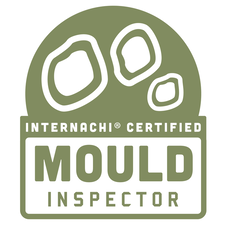 One of the biggest concerns I see as a home inspector involve air quality and mould. What exactly is mold and is it dangerous? The most important thing to know is that there is no such thing as “toxic mould” or “black mould”. Mould is a part of the fungi family, to which nobody knows how many species of fungi exist. The most common types of indoor molds are:
The main area of concern for the home inspector are:
So, what is a homeowner to think? This topic is a perfect example of why I am a systematic home inspector and not an “electrical” or “plumbing” or “structural” inspector as these systems are all interdependent in a home. While I could lull you to sleep with my many hours of research, the biggest takeaway is that moisture control is the key to mould control. Did I mention that moisture is the sworn enemy of the home inspector? Here are some steps you can take to keep mould growth at bay:
Moulds are not generally dangerous but any signs of mould (such as black patches on the bathroom ceiling) should be handled as soon as possible. Generally, it is NOT a good idea to use biocides, chlorine, or other disinfectants as this will not eliminate the root cause, and dead mould can still cause respiratory problems. The best course of action is to prevent mould from taking foot by…. you guessed it…. moisture control. You may have noticed some similarities to this article and my first article on radon and that is no coincidence: the strategies for clean air, mould, asbestos, and radon mitigation are largely the same and can be summed up in three points: source control, improved ventilation, and air cleaners. |
Archives
July 2024
Categories
All
|
|
Inside Edge Home Inspections Ltd.
Halifax, NS 902-209-9921 [email protected] Proudly Serving the HRM & Central Nova Scotia |
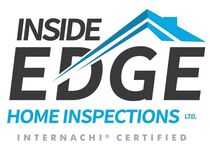
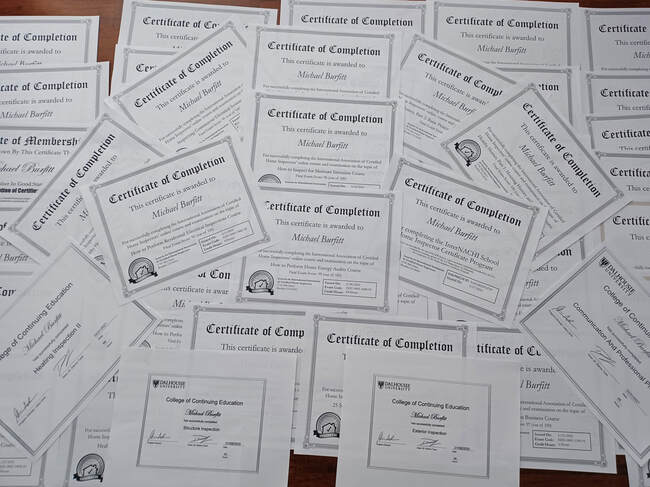
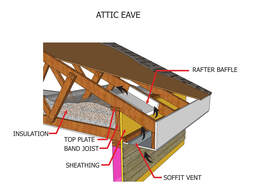
 RSS Feed
RSS Feed

